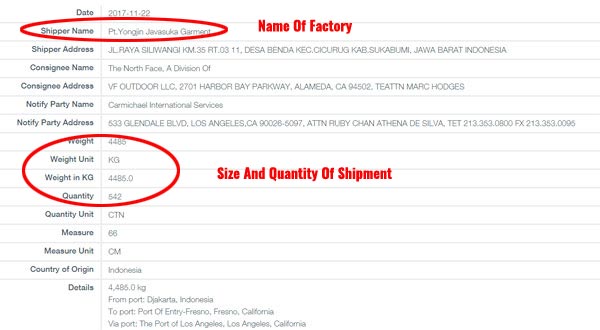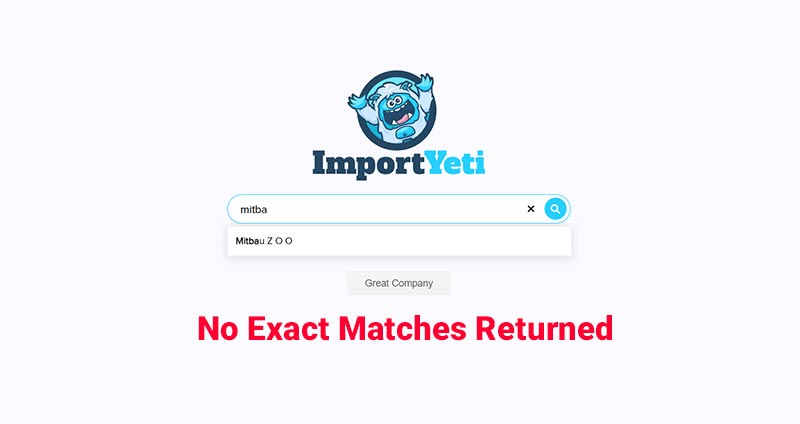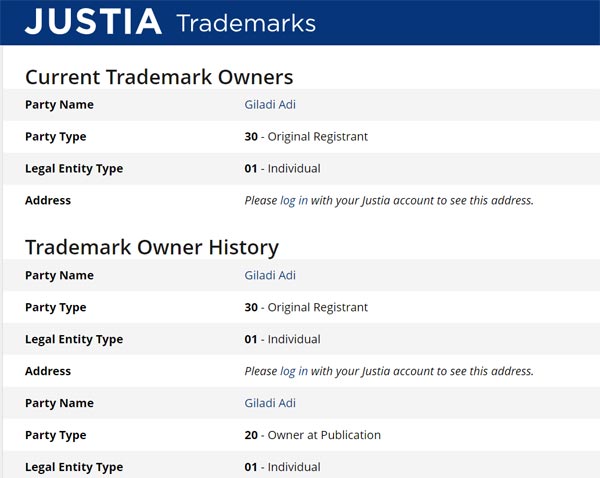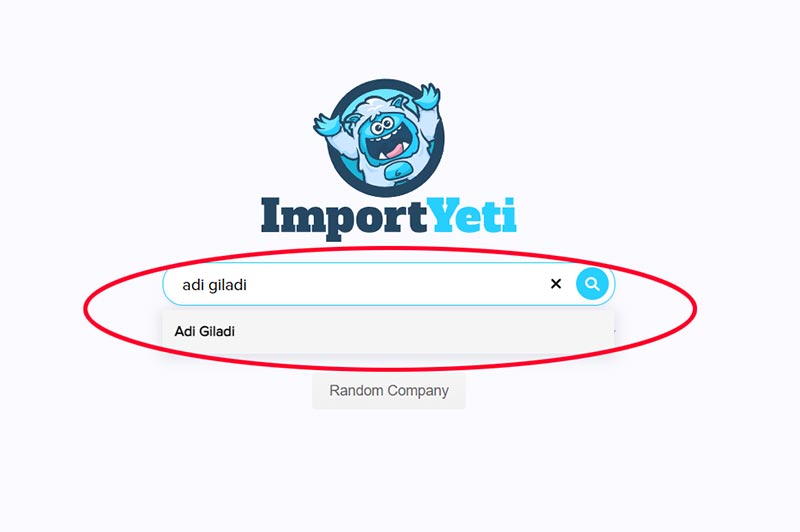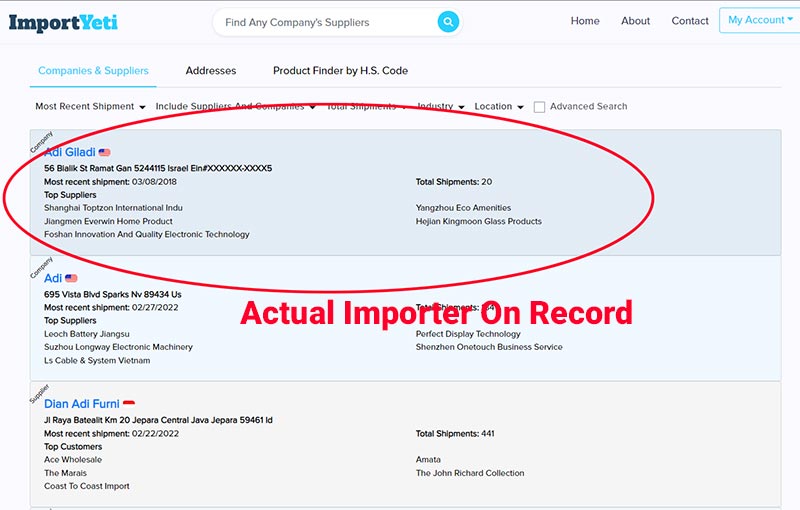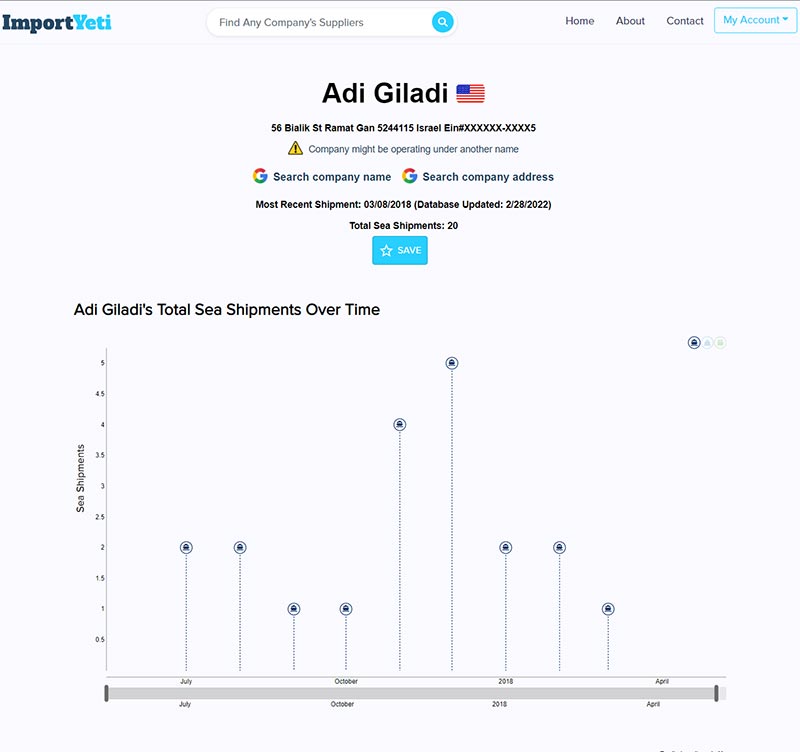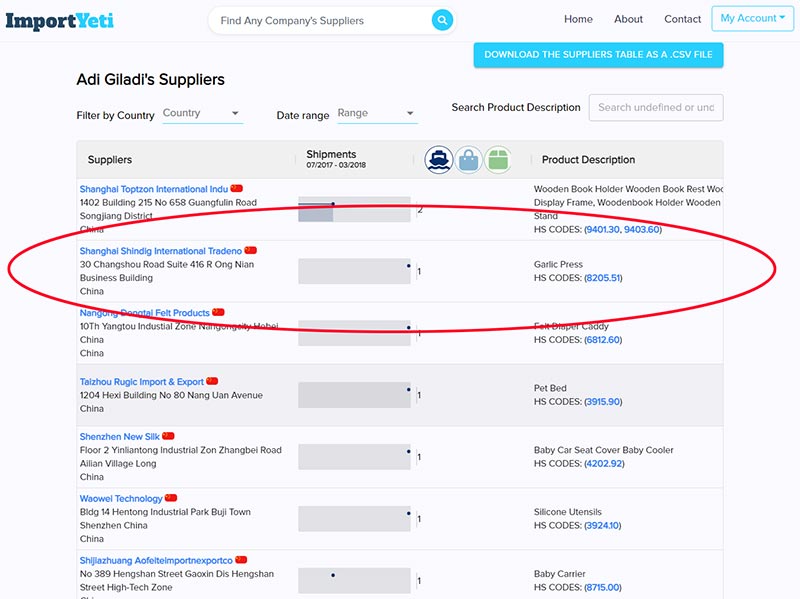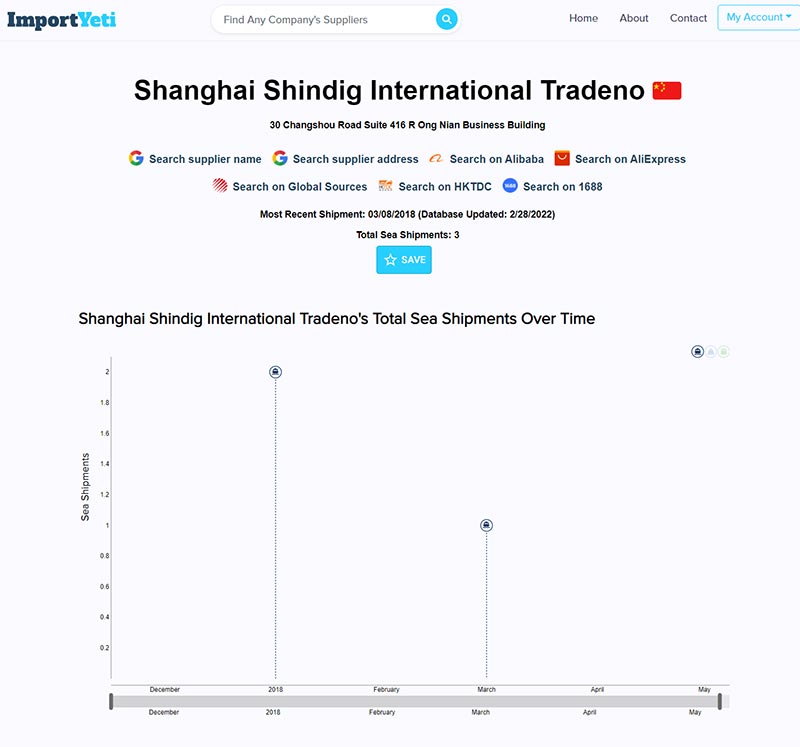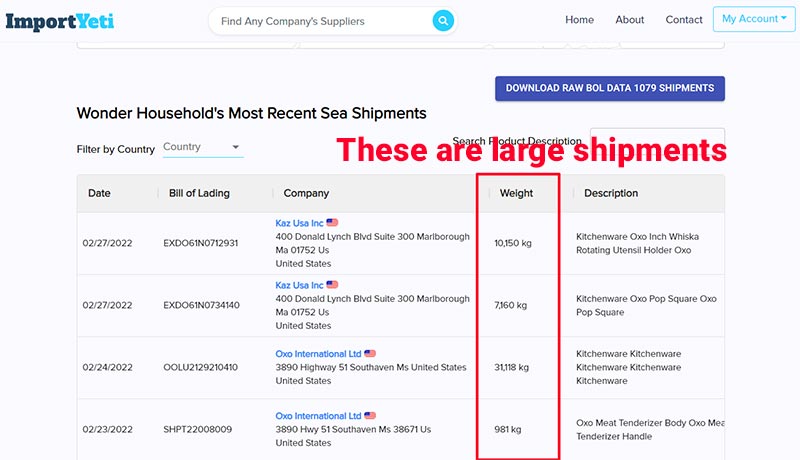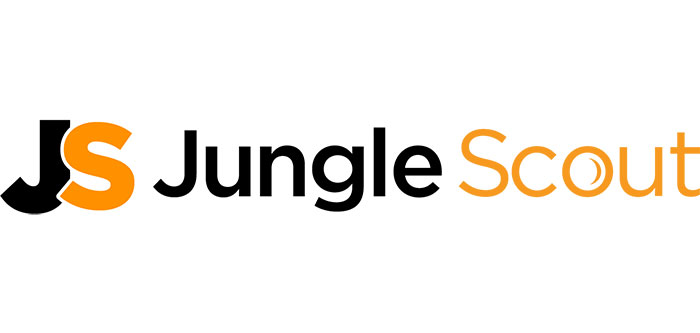Every shipment that passes through a sea port in the United States is documented on the public record. And with a free tool like ImportYeti, you can access these records to find useful information about any company’s suppliers.
With this data, you can…
- Research Your Competitor’s Suppliers – If you’re looking for a new factory, you can easily find and use the exact same manufacturers as your competition.
- Discover Your Competitor’s Best Selling Products – If you need product ideas, you can find out what your competition is importing from China.
- Know How Much Your Competition Is Importing – Analyze the health of your competition by dissecting their entire supply chain.
- Negotiate Better Pricing – Find out how much you are buying compared to other sellers to negotiate better pricing with your factory.
In this post, you’ll learn how to use a free tool called ImportYeti to access the US import and trade database to find wholesale suppliers.
Are you interested in creating a strong, defensible brand for your products? If so, I put together a comprehensive package of resources that will help you launch your own online store from complete scratch. Be sure to grab it before you leave!
What Is ImportYeti?
ImportYeti is a free online tool that allows you to browse the US import database to find out where retailers are sourcing their goods.
Every shipment that passes through a port in the United States must have a bill of lading which is free and public information.
A bill of lading contains important information such as…
- Date Of Shipment
- Name Of Factory
- Factory Address
- Retailer Name
- Shipment Weight
- Shipping Quantity
- Country Of Origin
- Other Detailed Shipping Parameters
ImportYeti was created by David Applegate in order to make import data accessible to ecommerce sellers. The tool is 100% free and David accepts voluntary donations to maintain the software.
How Does ImportYeti Work?
ImportYeti works by collating over 70 million US customs sea shipment records into a searchable database online.
All you have to do is type in the name of the retailer you wish to research and ImportYeti returns the following information.
- Total sea shipments over time
- A list of suppliers
- Product breakdowns based on HS Code
- A list of top 10 wholesale vendors
- Top 10 supplier relationships
- A breakdown of imports per country
- A list of most recent sea shipments
You can use this information to reach out to the same factories as your competitors and have your goods made by pre-vetted suppliers.
Is ImportYeti Legit?
ImportYeti is 100% legit and safe to use. The software simply collates information that is publicly available online into a searchable database.
In the United States, customs data and import records are public information. As a result, any company that imports products into the US from a foreign country by sea is documented on the public record.
All import records can be accessed directly from the United States Customs And Border Protection Agency. Other countries provide similar documentation but ImportYeti only supports the United States at the present time.
How To Use Import Yeti To Find Suppliers
Finding suppliers with ImportYeti involves 4 basic steps.
- Find the legal name of the company you are trying to research
- Use ImportYeti to find out your competitor’s suppliers
- Research potential suppliers by browsing the US import records
- Determine whether the supplier is a good fit for your company
Step 1: Find The Legal Name Of The Company
Before you use ImportYeti to conduct a search, you must find the legal entity name of your competitor’s business.
First off, locate the brand that you are trying to research. In this example, we are going to find the legal entity for a private label company on Amazon selling garlic presses.
The brand name is “Mitba” but typing this name into ImportYeti yields no results.
This means that the brand “Mitba” is not the name of the importer on record. Before performing a search on ImportYeti, you must find the real company name.
Every serious brand on Amazon files for Amazon Brand Registry which requires a trademark.
As a result, you can find the actual company name by performing a trademark search.
Using a tool like Justia, perform a search on the brand name.
Justia reveals that the brand “Mitba” is registered under Giladi Adi.
Step 2: Perform A Search On ImportYeti
Now that you know the legal entity behind the brand, you can type that into ImportYeti to retrieve the results. In this example, you would type “Giladi Adi” into the tool.
There is a match!
By clicking on the result, ImportYeti will return all of the import records for the company.
Step 3: Use The Import Records To Research Potential Suppliers
ImportYeti will provide you with a list of suppliers that the company uses along with detailed shipping records for each vendor.
According to ImportYeti, the brand “Mitba” imports their garlic presses from a company called Shanghai Shindig International.
From here, ImportYeti allows you to perform further research on the supplier by clicking a link.
Using ImportYeti, you can quickly perform due diligence on any of your competitor’s suppliers to answer the following questions.
- Does the supplier ship to your country? – If the supplier has never shipped to your home country, then you should not use that vendor.
- How large and established is the supplier? – Check to see how many customers the supplier works with. If a supplier makes only a few shipments per year, then they are likely a small factory or middleman.
- What production volume can the supplier handle? – Based on the size of shipments sent, you can determine whether a factory has the capacity to meet your production requirements.
- Does the supplier work with reputable brands? – If a supplier works with well known brands, they are likely reliable with exceptional quality control.
Step 4: Determine Supplier Fit For Your Company
Just because you find a reputable supplier on ImportYeti does not mean that the vendor will be a good fit for your company.
You also have to find out whether the factory can match your production requirements.
For example, popular brands like “OXO”, “Sur La Table” and “William Sonoma” import garlic presses from a company called Wonder Household.
As a result, this factory likely produces high quality products with excellent quality control.
However, these companies also import hundreds of thousands of units per month and likely have extremely high minimum order quantities.
If you are a brand new seller, you can’t use the same factories as the larger players.
Instead, you want to find a supplier that is willing to work with a company your size.
Overall, there are different factory types that work with different sized companies. Browse the shipping volumes for each manufacturer to find one that meets your requirements.
For more information, read this post on how to approach a new wholesale supplier.
How To Hide Your Bill Of Lading And Import Records
You can hide your bill of lading from the public record by using a 3rd party exporter of record service.
Basically, a 3rd party handles the entire shipping process on behalf of your company and becomes the “supplier of record” for the shipment.
As a result, your real supplier info will not be displayed on the bill of lading.
The other way to hide your import information from the public record is to request confidential treatment of your shipments.
There are 3 ways to request confidentiality.
- Submit an automated online application for electronic vessel manifest confidentiality here
- Submit a paper request to
Vessel Manifest Confidentiality
22001 Loudoun County Pkwy Mail Stop #1354
Ashburn, VA 20598-1354 - Submit an email request to vesselmanifestconfidentiality@cbp.dhs.gov
All confidentiality requests must be renewed every 2 years and you must submit renewal requests within 60 days of expiration.
ImportYeti Alternatives
There are 3 ImportYeti alternatives, Panjiva, ImportGenius and Jungle Scout.
However, all 3 tools charge a monthly recurring fee compared to ImportYeti which is 100% free.
Here’s an overview of the 3 ImportYeti competitors.
Jungle Scout Supplier Database
The Jungle Scout Supplier Database is a tool that allows you to browse the US import database to find your competitor’s suppliers.
Compared to ImportYeti, JungleScout offers a better user interface and collates the import records in a more organized fashion. However, JungleScout costs money.
If you sell on Amazon, chances are that you already own Jungle Scout. And the good news is that the Jungle Scout Supplier Database is included for free with any subscription.
Click Here To Save 30% on The Jungle Scout Supplier Database
Panjiva
Panjiva is a service that provides a searchable database to research the entire supply chain of any company.
ImportYeti offers the exact same information as Panjiva except Panjiva charges a high monthly fee to access the same data.
Right now, Panjiva does not publish the cost of their tool online and you must request a free demo to get pricing. But in the past, Panjiva used to charge $299/month.
Import Genius
Import Genius is a service that provides real time shipment records for any company in the US using a searchable database. But they also offer complete trade data for the following countries as well.
- Argentina
- Bolivia
- Chile
- Colombia
- Costa Rica
- Ecuador
- Mexico
- India
- Panama
- Paraguay
- Peru
- Russia
- Sri Lanka
- Ukraine
- Uruguay
- Venezuela
- Vietnam
Overall, ImportYeti is equivalent to Import Genius for accessing US import data. But the main reason to use Import Genius is to access the additional country info.
Leverage The Import Records To Find And Vet Suppliers
Thanks to ImportYeti, you can have access to the import records of any company in the United States.
This information is especially useful for Amazon sellers…
- When a competitor undercuts you in price, you can find out who their suppliers are and ask for similar pricing
- When you want to vet a new supplier to make sure that they are legit
- When you want to find suppliers that are not listed on Alibaba
- When you want to find out how your shipping volumes compare to other customers to negotiate a better price..
In the past, this data used be expensive. But thanks to ImportYeti, this data is now free for the masses!

Ready To Get Serious About Starting An Online Business?
If you are really considering starting your own online business, then you have to check out my free mini course on How To Create A Niche Online Store In 5 Easy Steps.
In this 6 day mini course, I reveal the steps that my wife and I took to earn 100 thousand dollars in the span of just a year. Best of all, it's free and you'll receive weekly ecommerce tips and strategies!
Related Posts In Products To Sell On Amazon
- How To Clear Customs And Navigate The Customs Clearance Process
- Top 17 China Sourcing Agents And Service Companies – A Vetted List
- How To Sell Books On Amazon: A Step-By-Step Guide
- Amazon Best Sellers – How To Pick Top Selling Products For FBA
- The Best Products To Sell On Amazon To Make A Profit

Steve Chou is a highly recognized influencer in the ecommerce space and has taught thousands of students how to effectively sell physical products online over at ProfitableOnlineStore.com.
His blog, MyWifeQuitHerJob.com, has been featured in Forbes, Inc, The New York Times, Entrepreneur and MSNBC.
He's also a contributing author for BigCommerce, Klaviyo, ManyChat, Printful, Privy, CXL, Ecommerce Fuel, GlockApps, Privy, Social Media Examiner, Web Designer Depot, Sumo and other leading business publications.
In addition, he runs a popular ecommerce podcast, My Wife Quit Her Job, which is a top 25 marketing show on all of Apple Podcasts.
To stay up to date with all of the latest ecommerce trends, Steve runs a 7 figure ecommerce store, BumblebeeLinens.com, with his wife and puts on an annual ecommerce conference called The Sellers Summit.
Steve carries both a bachelors and a masters degree in electrical engineering from Stanford University. Despite majoring in electrical engineering, he spent a good portion of his graduate education studying entrepreneurship and the mechanics of running small businesses.




